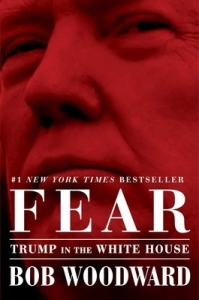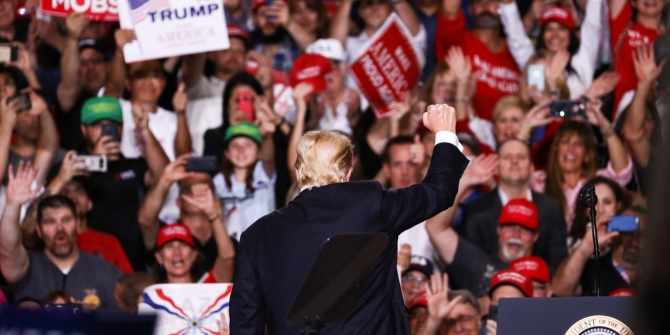Fear: Trump in the White House, written by veteran Washington Post reporter, Bob Woodward, is the latest contribution to a growing library of commentary on the early days of the administration of President Donald Trump. Splitting the administration so far into three parts, pre-election, and before and after the firing of adviser Steve Bannon, the book includes many insightful references to resistance to the president from within the administration itself as well as to Trump’s chaotic management style write Peter Finn and Robert Ledger.
 Fear: Trump in the White House. Bob Woodward. Simon & Schuster, August 2018
Fear: Trump in the White House. Bob Woodward. Simon & Schuster, August 2018
During the 2016 Presidential Campaign and into the administration of Donald Trump, there has been no shortage of journalists, academics and social commentators willing to attempt to codify the chaos (carnage to his critics, creative destruction to his supporters) that the 45th president of the US has wrought. There are also an increasing number of biographies from those with knowledge of intimate aspects of his political rise, election and time at 1600 Pennsylvania Avenue.
Of these, Michael Wolff`s Fire and Fury, whose main selling point was the access Wolff was granted to the West Wing in general and Trump strategist Steve Bannon in particular was, perhaps, the earliest tome to cut through the noise and become news in and of itself. Next into this category was the biography of former FBI director James Comey, whose book, written after Trump fired Comey in a failed attempt to stall an investigation into potential links between Russia and Trump’s campaign staff provided (for the President’s critics at least) ample evidence that Trump has willfully attempted to obstruct justice. Most recently, the book from Omarosa Manigault Newman, along with her drip feed of recordings she made while working for Trump, has provided insight into the dysfunctional nature of Trumpland. Moreover, the reaction of Trump to all of these, and especially his dehumanizing reaction to Newman’s book, appear to demonstrate an obsession on what others say about him as opposed to a focus on governing.
None of this trio, however, came close to the publicity that preceded the release of Fear: Trump in the White House by veteran Washington Post reporter Bob Woodward, famous for his role in helping to uncover the Watergate scandal in 1972. As a result of this publicity, many of the book’s most shocking details were already in the public domain prior to its release. This also applies to the knowledge that the book documented a large number of abusive words used to describe Trump by key figures (Trump is variously described as a ‘moron’ and a ‘professional liar’), as was the fact that Woodward argues that many of the same people had engaged in the continual subversion of the President’s wishes. General John Kelly, who became Trump’s Chief of Staff in Summer 2017, labels Trump an ‘idiot’, for instance, and is shown to have co-authored a memo stating any ‘‘decision made following an oral briefing’’ was ‘’not final until’’ a ‘decision memo’ was signed off. This was a move designed to prevent oral orders given in the heat of the moment from having weight. Woodward labels this attempt to order chaos ‘fantasy’ whilst former White House Staff Secretary Rob Porter, co-author of the above memo who left the Trump administration under a cloud related to domestic violence in February 2018, is described by Woodward as having removed numerous documents from the president’s desk to prevent him from signing them.
“Trump MAGA rally in Mesa, Arizona” by The Epoch Times is licensed under CC BY 2.0
Deliberate attempts to neuter Trump pepper the pages of Fear, a trend which, in a memorable turn of phrase, Woodward labels an ‘administrative coup d’état’. Satisfyingly for the reader, these details, rather than losing their impact when subsumed in a broader narrative, actually play a key role in thickening out a book that contains a disturbing amount of similar incidents. Whether the administration official who wrote a New York Times op-ed in the week prior to the book’s release, in which the author claimed to be part of a resistance to Trump operating inside the administration was described in Fear is as yet unknown. Though speculation about potential authors abounds. Yet, the synergy between the picture painted in the op-ed, which describes a group of administration officials who are working together to thwart Trump’s erratic behaviour, and the pattern described by Woodward is eerily similar.
Fear picks up in September 2017, a point in time that conveniently (and deliberately?) chimes with the end of the period covered by Wolff (whose book Fire and Fury crescendos into the resignation of Bannon in August 2017), before circling back to cover the period that marked Trump’s transformation from reality TV star and celebrity developer to political hopeful.
Though not divided in a formal sense, Fear can be broadly split into three parts; pre election and pre and post the firing of Bannon. With the third section running till March 2018 and the resignation of Trump’s personal lawyer John Dowd. A high profile US attorney drafted in to help Trump defend himself against the Mueller investigation. Dowd’s resignation, we learn, occurred not because of any belief that Trump colluded with Russia, but because Dowd had come to believe Trump was a ‘fucking liar’. Indeed, the book is packed full of quotes that express profanity. Something that, although giving the reader ample evidence of the seemingly vulgar nature of most conversations involving the President, rather loses its impact after one is subject to yet another expletive.
Fear is primarily aimed at the general reader and, as one would expect from one of America’s most celebrated journalists, is written in an engaging fashion. Those readers interested in policy-formulation, such as it is, will find the chaotic nature of strategy discussions an illuminating window into Trump’s erratic management style. A strand of tragicomedy runs through these discussions, in particular, chief economic advisor, Gary Cohn’s futile attempts to point out the basics of trade and economics, only for the President to repeatedly return to his simplistic mercantilist view of the world. More generally, Fear articulates a zero-sum view of global politics: either the US wins or loses, security catastrophes and threats are never far away (the chapters on North Korea are particularly disconcerting), multilateralism is essentially instrumental. A world-view whose ultimate conclusion was encapsulated by Woodward as ‘not only America first, but America only.’
Woodward’s book covers the Trump presidency until early 2018 well. In so doing, it provides a fascinating, if unsettling, window into the administration. There are sure to be many more studies following in its wake. Woodward has certainly set a high bar for others (and himself) to live up to.
Please read our comments policy before commenting.
Note: This article gives the views of the author, and not the position of USApp– American Politics and Policy, nor of the London School of Economics.
Shortened URL for this post: http://bit.ly/2QbAQRm
About the reviewers
Peter Finn – Kingston University
Peter Finn is a multi-award-winning lecturer in Politics and PhD candidate at Kingston University. His research is focused on conceptualising the ways that the US and the UK attempt to embed impunity for violations of international law into their national security operations. He is also interested in US politics more generally, with a particular focus on presidential power. He has, among other places, been featured in The Guardian, The Conversation, Open Democracy and Critical Studies on Terrorism.
Robert Ledger – Schiller University
Robert Ledger has a PhD in political science from Queen Mary University of London. He has worked for the European Stability Initiative, a think-tank in Brussels, lectured at several universities in London and currently lives in Frankfurt am Main. He is a Visiting Researcher (Gastwissenshaftler) in the History Seminar at Goethe University and also teaches at Schiller University Heidelberg and the Frankfurt School of Finance & Management. He is the author of Neoliberal Thought and Thatcherism: ‘A Transition From Here to There?’








Go to DOI: 10.4236/ojps.2019.91006 (transfer this doi to Search, and then click on Open Journal of Political Science – SCIRP to see a book review entitled “Fear is a Book of Fiction Mixed with Real Events” by Freddy A. Paniagua, which is about Bob Woodward’s Fear: Trump in the White House.” This is the first book review about Woodward’s book “Fear” published in an academic journa.